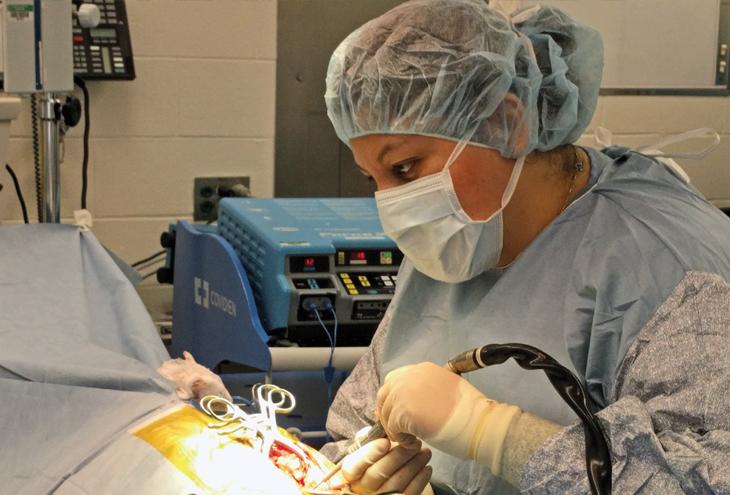If you’re passing an operating room at the University of Pennsylvania’s Ryan Veterinary Hospital and hear some funky jazz or Hawaiian guitar, chances are the surgeon is Dr. Evelyn Galban. “I always have music to defuse the stress. Every decision I make must be in the best interest of the patient, which as you can imagine is hard to explain to them,” says Galban, a clinical assistant professor of neurology and neurosurgery in Penn Vet’s Department of Clinical Studies. “My biggest concern is always for their well-being.”
For Galban, in addition to music, practice and persistence have been key to relieving stress and gaining confi dence in her chosen profession. “My very fi rst surgery was an ovariohysterectomy (spay) on a cat. I was very nervous at fi rst, but I volunteered at shelters and performed hundreds of spays and neuters,” she says. “When I was comfortable, I was able to focus on my training, and I moved onto neurosurgery. Now I routinely perform spinal and brain surgery.”
One reason she’s right at home in her university setting may be because when she was just four years old, she would tag along with her father to his classes at the University of Nevada, Reno. “He was taking notes, and I was drawing the professors next to him,” she laughs. “My father graduated with an engineering degree.”
Galban grew up in Rochester, N.Y., surrounded by a community of urban Indians. She stayed in New York for college, earning three impressive degrees at Cornell: a BS in biology with a concentration in American Indian studies, a master’s in wildlife science, and a doctorate in veterinary medicine.
Throughout her college years she noticed something missing: American Indian students like her who also wanted to become veterinarians. “Needs are so great in many Native communities that when students are interested in health professions, they often choose human medicine, dentistry, or pharmacy,” she explains. “There are many reasons for this, but I personally do not want one of them to be a lack of exposure to either veterinary medicine or positive role models.”
To help attract more Native students to the field, last year Galban founded the Native American Veterinary Association. She runs a Facebook page to spread the word. It includes a link to a podcast from the Association of American Veterinary Medical Colleges, where she speaks about diversity and inclusion. “Veterinarians work in all facets of universities, private practice, zoos, and government worldwide to fulfill their oath to prevent and relieve animal suffering and conserve animal resources,” she says.
Galban believes that American Indians recognize the spirit of animals and have a close relationship with them, including so-called rez dogs. “Dogs have been important companions and helpers to Native people,” she says. “The free-roaming rez dogs are increasing in numbers, and unfortunately, disease and injury are on the rise. Some organizations are working to provide care for these lovable characters, but I’m sure they would welcome help.”
Galban keeps her own menagerie at home. “I have two long-haired cats, Leo and Bird, and one Australian cattle dog, Jack,” she says. “I also have three fish named for two outstanding neurologists and a famous patient.” As a college student Galban was active in AISES and received scholarships. As a professional she comes back to talk to students about her career. “It’s a challenging field, but don’t let this prevent you from working hard and applying. I was rejected twice before I was finally accepted into veterinary school at Cornell,” she says.
What helped Galban overcome more than one obstacle was her determination to find advisors who could help. “I needed guidance to improve my application,” she says, “and in the process I earned my master’s in wildlife science. And at the end of my residency journey, I failed my board exam twice before I passed and was made a diplomat of the American College of Veterinary Internal Medicine (neurology). I needed guidance and I needed focus. Each of my falls led me to find strength and rise ready to succeed.”
Now she’s ready to help others in turn. Her Facebook group is slowly growing and recently she fielded her first student inquiry. “I was very happy to receive a request for guidance and information on our association from a prospective Native student. I was so very excited for the opportunity to share my experience and advice,” Galban says. “Animals are vital to the circle of life and they need people who understand this very special relationship to fight for them.”











